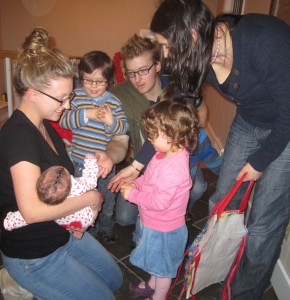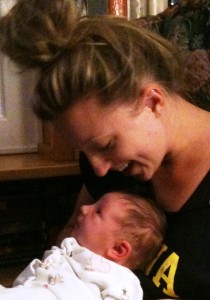The holidays offer great times to get extended family members together, and most families try to do it. We’re no different, and the first grouping has just arrived. Hans and Katy, who live in north England, flew across the Atlantic yesterday and ended their long, tiring journey at my house, about dinnertime.
The little ones, ages 3, 2, and 2, hopped out of the van and came bolting toward me in a little pack of enthusiasm, arms spread wide, yelling, “MeeMee! MeeMee!” It was a greeting of love I won’t soon forget! Despite battling jet lag, they held up beautifully through the evening, and when they saw the welcome-cake Louisa had baked, their eyes opened wide! (In a phone call from Britain several days before, I’d asked them what kind of cake they each liked best. Their preferences, green, pink and black, were all baked inside.)
Equally exciting, though, was meeting their new little cousin, Emerald. By the end of the day her little head had been covered with heartfelt kisses and cuddles, and I learned that 2 year old Evelyn has a baby growing in her tummy, too. The fact that she has a new brother or sister growing inside her mommy’s tummy might have had something to do with her announcement.
Next week our census will increase as Linnea’s family of 5 arrives, along with Nelson who will be coming home from Armenia via commitments in Denver, Montana, and Kona. Also on hand will be Lars and Louisa from Chicago, and of course Klaus, based near me year-round. And that’s all of us.
Expectations are running high that events will unfold smoothly, favorite traditions will be kept, good health will hold, and happiness will reign. What family doesn’t hope for all that at the holidays? We picture a Thomas Kincaid painting with fluffy snow on the ground, children playing without bickering, and everyone thrilled with their Christmas gifts.
It’s when this kind of optimism is soaring that we have to be most careful. I don’t think any family hasn’t experienced holiday disappointment during one celebration or another. Maybe it’s distressing conversations or friction during mealtimes, and they’ve become as much a holiday tradition as Christmas brunch. None of us want that, but gathering flawed people together with hopes for a perfect occasion is hardly logical.
So what can be done?
- I can work to model an example of cheerfulness, regardless of what others do.
- I can commit each holiday get-together to God’s care, beforehand.
- I can diffuse stress by interjecting praise and gratitude.
And if all that fails, I can simply dish up the cake!
“Rejoice evermore. Pray without ceasing. In everything give thanks.” (1 Thessalonians 5:16-18)






